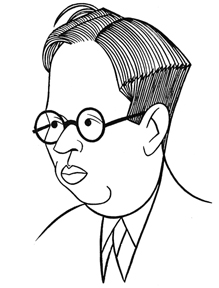Here are 10 things you should know about Verree Teasdale, born 120 years ago today. She enjoyed success on Broadway, in pictures and on radio.
Tag: Philip Barry
10 Things You Should Know About Steve Cochran
Here are 10 things you should know about Steve Cochran, born 106 years ago today. He was as well known for his tumultuous life offscreen as for his work on-screen.
10 Things You Should Know About Ann Harding
Here are 10 things you should know about Ann Harding, born 120 years ago today.She worked steadily for 35 years on stage, in pictures and on TV, but her time in the spotlight was brief. TCM has gone a long way in renewing interest in—and appreciation of—her film career.
Times Square Tintypes: Elmer Rice
In this chapter from his 1932 book, Times Square Tintypes, Broadway columnist Sidney Skolsky profiles Pulitzer Prize-winning playwright Elmer Rice.
ELMER THE GREAT
THE 1929 Pulitzer prize play winner: ELMER L. RICE. He was born September 28, 1892. The locale: Madison Avenue near 106th Street. Until he was twenty-six he lived within a radius of two miles of his birthplace.
He likes to go for long walks, wander through museums and look out of windows.
Graduated from public school. Went halfway through high school. He has no recollection of learning anything there of value to him. Later studied law. When he was admitted to the bar he quit the profession.
He is married and has two children—Robert, aged twelve, and Margaret, aged nine.
Hates to get up in the morning. His friends know enough never to disturb him before ten-thirty.
When he finished writing Street Scene he was critically ill. His wife peddled the play, bringing it first to the Theatre Guild. They rejected it and so did John Golden, Jed Harris and Arthur Hopkins. The news that Street Scene had been rejected by these producers was kept from Rice until he recovered from his illness. An agent sold the play to William A. Brady.
He has never been to a night club and never intends going.
Doesn’t care for the theater. He attends about three times a year and then sees musical comedies. Recently, because he has to cast two plays next season, he has been going to the theater three or four times a week. He has yet to see the third act of a play this year.
His name was Elmer L. Reizenstein. The L is for Leopold.
He owns some bum oil stocks.
The first time he ever went to the theater was when he was eighteen years old. Three years later he wrote his first play. It was On Trial. Similar to Street Scene, it was rejected by almost every producer, and then was a big hit when finally produced by Arthur Hopkins. William A. Brady was one of the many who rejected it.
Is especially fond of fat German pretzels and beer.

